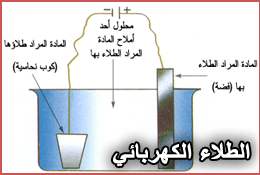-
Well, I have to put in one vote for Ehab's side... we definitely did electoplating, both in high school (in San Diego) and in college (Caltech). The interesting part of the electroplating experiment that we did in Caltech was when we figured out the exact charge of a single electron by weighing the amount of electroplated silver after a known amount of current. I think it's a pretty cool experiment... Perhaps you guys just had bad teachers who made the subject dull and boring?
I'm curious to know what you are really researching in your clean rooms? Do you guys make printed IC boards? Correct me if I'm wrong, but I believe that in the olden days, the main way to make an electronic circuit board was to use electroplating of copper onto a printed circuit (was it etched somehow with the appropriate anode chemical in order to get the copper to make a substrate on the surface???)
Anyway, good job, Ehab, fun lesson, and don't take any crap from Mohammed! ;-) -
By the way, welcome Jazuli!
-
@ jazuli14
Your question about the verb “qaala” (ﻗﺎﻞ) is quite interesting. If you examine texts written in classical Arabic you’ll find sentences like “maadha qaala lak?” (What did he tell you?). In such cases “qaala” (ﻗﺎﻞ) and “lak” (ﻠﻚ) are written as separate words. If, however, you look at the texts of contemporary pop songs (generally written in dialect) you’ll find forms like “gaallak” (ﻗﻠﻖ). The initial letter of the verb is pronounced like the “g” in Engl. “get”, and the final “a” is dropped, so that the two “l” sounds come together. There are also thousands of pop songs (and even a few nashiids) where the initial “qaaf” is pronounced like a glottal stop.
The adjective “’ajiib” (ﻋﺠﻴﺐ) has several meanings: (1) “wonderful” or “marvellous”, (2) “bizarre”, (3) “unusual”. These meanings tend to shade off into each other.
“Tilaa’” (ﻄﻼﺀ) is also quite an interesting term. It can mean “plating”, “paint”, “pigment”, “dye”, “varnish” or “coating”. It’s easy to see what these meanings have in common. -
Welcome Jazuli to our humble group of geeks who love to learn Arabic! :-p
Lower Intermediate - Electroplating
| September 3rd, 2011 | 1 comment |
We talk about a scientific process in which metal ions in a solution are moved by an electric field to coat an electrode. Doesn't that sound exciting?! Don't worry, there is plenty of Arabic vocabulary to suit all interests.
 |
 MP3 Download MP3 Download
 PDF Transcript PDF Transcript
|
 Audio Transcript Audio Transcript Exercise Exercise PLC PLC |
|
| Basic | Premium | |
|---|---|---|
Join the Discussion

Random Word
ذكي |
|

Advertisement



As for the question about familiarity with electroplating - though I did go through a normal set of science classes growing up in Canada, I don't recall doing such an experiment. I'd side with Mohamed on this one.
Some comments and questions:
On the word "3ajib" (عجيب), I have understood it can mean "strange" or "weird" but also can be used in wonderment or amazement. I would suspect a better translation might be "Amazing - didn't he say what the secret was?" Please do correct me if I'm wrong here.
I have a question on the verb used for "to say" (قال). You did mention during the lesson that this was in the colloquial form - "qallak" (قلك) and "qalli" (قالي). This is throwing me off a bit. How would I say this in classical or MSA? Would it be "qala lak" (قال لك) and "qala li" (قال لي)?
Thanks,
Ahsan